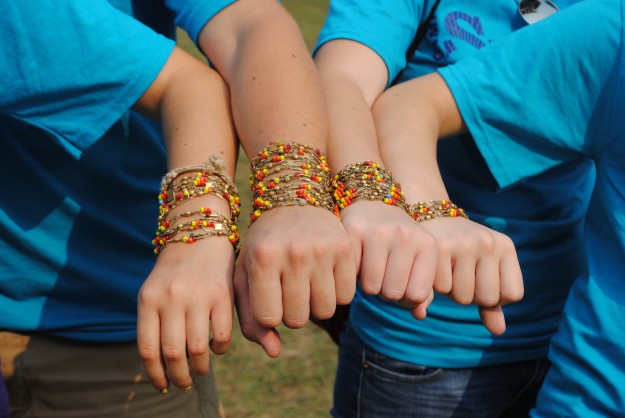***With the end of summer, we bring you a three-part series about Camp Sunrise, a place of summer fun for pediatric oncology patients at the Johns Hopkins Kimmel Cancer Center. Part two features Amanda's story.
What began in 1986 with seven campers has grown into the Kimmel Cancer Center-managed and -operated Camp Sunrise. The camp is entirely volunteer run, with more than 120 campers, 80 trained volunteers and more than 50 medical staff members. Most of the volunteers, including camp directors Marilyn Scalf and Steve Mitchell, were former campers, and many of them have been associated with Camp Sunrise for more than 20 years.
Among them are Annapolis stained glass artist Bobbie Burnett, who has made sun catchers with campers for the past 30 years, and Alex Johnston, who cooks meals for campers. Each year, volunteer Jaclyn Young helps campers make bracelets with special beads that commemorate the year. Some campers boast multiple bracelets, signifying their many visits to Camp Sunrise.
For one very special week each summer, campers and volunteers come together at Elks Camp Barrett in Crownsville, Maryland, for hiking, archery, swimming, rock wall climbing, dancing, crafts, games, sports, campfires and reunions with friends. “It really makes your heart warm. It’s the best feeling inside to see these kids so happy,” says Scalf.
A PLACE LIKE NO OTHER
Camp Sunrise may be the only place where cancer takes a backseat to childhood and teenage fun. For this one week, cancer is not their primary focus. “Our goal is to give campers the best week of their lives,” says Jordan May, a former camper turned volunteer. Beyond the fun, campers treasure the direct connection to other kids who understand and share their unique experience.
“I’ve been going to camp for nine years, and the reason I keep coming back is the relationships, the family I have with these people. I’ve known them almost my entire life. We’ve been through so much together. It just means so much to me. I have to come
back to see them,” says Billy.
Almost every year, there are a few campers who are in hospice care. Camp Sunrise is one of their last experiences, and that realization is not lost on the campers or volunteers. At the end of camp each year, the entire group gathers to plant a tree and decorate it with handmade ornaments that honor campers who lost their cancer battle. As campers return year after year, they see these trees and remember their friends.
SOMETHING FOR EVERYONE
At Camp Sunrise, there is something for everyone. Unlike other camps, no camper is too young, old or sick for Camp Sunrise. Younger campers, 4 and 5 years old, participate in a day camp, and campers 6 to 16 come for a traditional residential sleepover camp, complete with rustic cabins and plenty of outdoor adventures. The older 17 and 18-year-old campers take part in a leadership training program so, if they choose, they may join the ranks of the Camp Sunrise volunteers as camp counselors.
For patients who can’t leave the hospital to go to Camp Sunrise, there is “Camp at Hopkins.” Camp volunteers devote some time to go to the hospital and work with the Child Life teachers to make sure inpatients also have a camp experience with art projects and other activities. The highlight is a special robot that allows the campers at “Camp at Hopkins” to connect with campers at Camp Sunrise.
THE FUNNY FARM
About one-quarter of patients who attend Camp Sunrise are actively being treated for cancer. They rely on the more than 50 Kimmel Cancer Center physicians, nurses and physician assistants who care for them in the medical room campers have dubbed the “Funny Farm.” The medical staff members leave the cancer center and volunteer their time to make sure caregivers are on hand 24 hours a day to administer chemotherapy, draw blood for lab work and provide any other care needed. Campers also come to the Funny Farm for care of camp-related bumps, scrapes, and bruises.
Donald Small, Director of Pediatric Oncology, is among the physicians providing care to campers. “When I see these kids in the Cancer Center, often they are sick, and we’re administering very complicated therapies,” says Small. “Then I see them at camp each year playing and having such a great time. It’s a wonderful thing for me and for all of the medical staff to see.”
CANCER DOESN’T CALL THE SHOTS
For most kids, a cancer diagnosis makes summer camp an impossibility. It becomes one more thing that makes them different from others their age. At Camp Sunrise, cancer doesn’t call the shots. Prostheses are hung behind doors on coat hooks, wigs and scarves are often put aside in favor of bald heads, and no explanations are necessary. Everyone fits in, and everyone there—campers, counselors and volunteers—understands.
Cancer, particularly in children and teens, is more than its physical manifestations. As it disrupts the normal, day-to-day activities and relationships, it also takes an emotional toll. The clinicians and scientists at the Kimmel Cancer Center provide the research, discovery and care that heal the body, and places like Camp Sunrise heal the soul.

Twenty-four years ago our granddaughter was diagnosed with AML and she attended Camp Sunrise many times through the years. She now is the proud Momma of a 15 month old, beautiful little girl and has been cancer free for twenty-three of those years. She loved Camp Sunrise and all the friends she made there and it will be forever etched in her mind and heart. Thanks to all who made it work its magic 30 years ago and those who continue to make it so special today. God Bless all of you!!!!
Comments are closed.